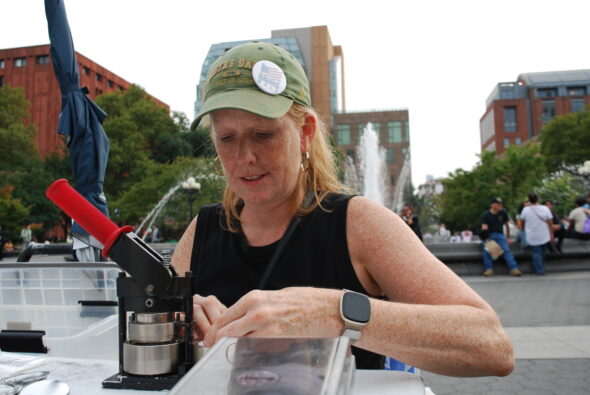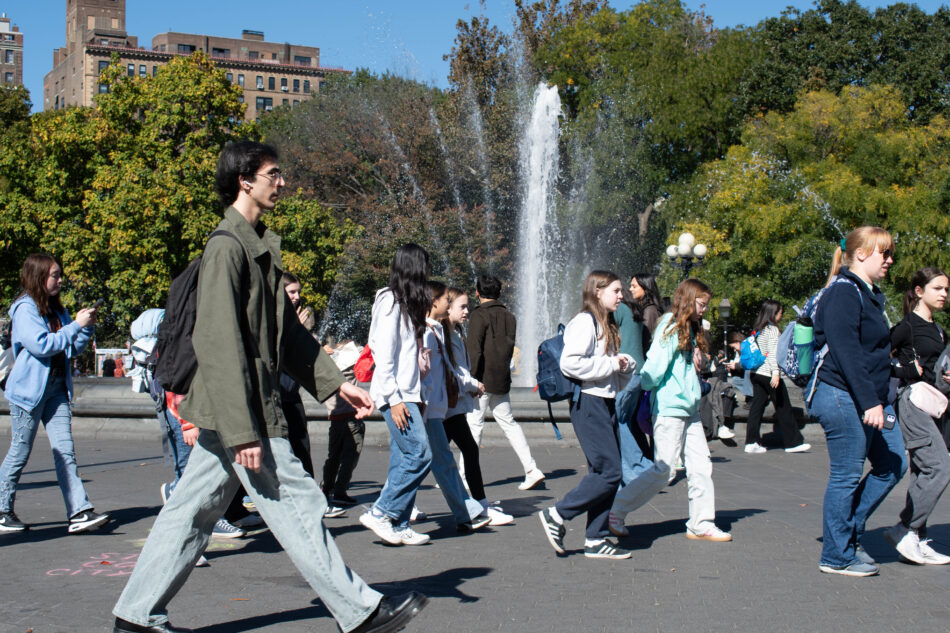Mallory McNee, 19, looked over her shoulder and whispered as she spoke.
“I think one of the issues that matters most to me isn’t really being addressed. Like, the war [in Gaza] that’s happening right now,” McNee said.
Despite this, McNee, a recent transfer to NYU who’s family is from North Carolina, still believes in voting. Noting that the outcome of the upcoming election may be a close one, she recognizes that her vote may carry more weight in a swing state like North Carolina. Still, with neither candidate addressing her concerns, she finds it hard to find a reason to vote.
“I don’t love where the [Democratic] party is right now, I don’t agree with a lot of things, but I sort of feel some pressure to vote,” McNee said. “In all honesty, I do think there’s some guilt. I feel like, if you have the power to vote, if your country gives you that opportunity […] I just feel like if I have that opportunity, I should use it because there are places where you don’t have that.”
Before McNee transferred to NYU, she was a part of the People’s College at Bryn Mawr College, where she learned more about the uncommitted vote. A speaker in one of her classes expressed his viewpoint on the uncommitted movement to the students. He spoke about the movement and its purpose in sending a message to politicians as a form of protest. Having heard this message, she believed in what he said and was committed to not voting in this year’s upcoming election.
“I had been feeling very displaced within the two-party system and felt validated to see that reflected by a scholar, as many of my peers were not,” McNee said.
The Uncommitted Movement started in Michigan, and recently announced that although they will not be endorsing former President Trump, they will also not be endorsing Vice President Harris either. They are dissatisfied with Harris and her policies, in particular the refusal to allow a Palestinian American speaker at the Democratic National Convention, and the lack of a cease-fire deal.
Leaders of The Movement spoke to The Guardian about their recent views and non-endorsement of Harris. Mainly aligned with the Democratic Party, delegates recognize the dangers that another Trump presidency could bring. They are not recommending a third-party vote either, as they see this as inadvertently aiding the Trump presidency. Nonetheless, they are encouraging uncommitted voters to vote “anti-Trump” up and down the ballot.
In New York, this movement is known as the “Leave it Blank” campaign. During the Democratic primary earlier this year, City & State New York determined that 12 percent of the overall vote chose to leave the ballot blank. In New York City, that vote was 15 percent.
McNee grew up in liberal leaning Palo Alto, CA, where her parents never taught her about politics. With her dad being a Trump supporter and her mom a Democrat, she sees both sides of the spectrum and has sought out her own opinions from peers, classes and teachers. When McNee spoke up about her beliefs on the uncommitted movement in a class, she was told she was wrong.
“I was in this politics class last semester at my old school, and I expressed this whole thing of, ‘Well, there’s a big movement happening where people don’t want to vote,’” said McNee. “The teacher, the whole class, was super, at that time, pro-Biden, and they were like, ‘Okay, but you have to vote for Biden because then it’s Trump.’”
She described how she understood what her teacher and peers were saying, but also questioned the democratic nature of the political system.
“Isn’t it about what you believe in? If you’re just voting because you’re compelled to, that’s not a choice, that’s not freedom, if you’re just voting for the lesser evil,” McNee said.
People were explaining to her that if she didn’t vote for Biden or Harris, then she would be putting issues such as abortion, healthcare and education at risk. Even so, she feels like these ideals put a lot of pressure on people to abandon their principles.
Young voters came out in record numbers to support Biden in 2020, yet in a recent poll conducted by NBC News, even though statistics are improving, they are still not quite at the numbers held previously. Many issues most Gen Z care about the most, like cost of living and the Israel-Hamas war, are seen as the main reasons for being on the fence or choosing to abstain from voting.
Ian Novoselac, 17, is eligible to vote on Nov. 5, 2024, his 18th birthday. The film and television first-year student at NYU pre-registered to vote, and sees it as his duty to make an informed decision about making a choice for a candidate that will affect his future. Concerned about what life will look like for him once he graduates from college, he doesn’t believe living in Manhattan as a post-grad will be possible.
Novoselac will vote in this upcoming election, as he feels a moral obligation to vote, especially in times as divided as these.
“I feel like young voters are turned away from voting because they don’t know what the kind of power that a president can truly have, not just on those four years that they’re in office, but the effect that they will have down the line,” Novoselac said. “And I feel like if you can find a way to show those students just how important a president right now would be in their lives in the future, that would motivate them to get out there and vote.”
With the addition of Harris in the race, many young voters felt reinvigorated into voting for a younger, woman and person of color candidate. Still, it remains a toss up on who they choose to vote for, or if they are even registered to vote. According to the Civics Center, 42.7 percent of New York State’s 250,000 18-year-olds are registered to vote. New York also makes it possible for 16 and 17 year olds to pre-register to vote, but as of August 2024, the Civics Center says that only 20.1 percent of those teens are pre-registered.
Novoselac, who pre-registered to vote, explains how simple the process was for him, and why he chose to do so.
“The process was super easy. I chose to do it early just because that’s the only way that I would have been able to vote. I wouldn’t have been able to go in on the day of voting. Or maybe I would, but it would have been just too stressful to go in on the day that I turn 18, which is also Election Day, and register then,” Novoselac said. “So pre-registering is just like a way to make that smoother. And the process was very, very simple. It took like 20 minutes max.”
NYC voter turnout is historically low, and organizations and businesses around the city are working to inform young constituents about the importance of voting.

Kristin McGowan, 53, makes buttons for her small business,
which she sells in Washington Square Park. (Photo by Miah Cox)
Kristin McGowan owns a small business in Washington Square Park. She caters to the thousands of people that pass through the park everyday, including NYU students. NYU students voter turnout is historically as low as the city itself, with organizations on campus, like NYU Votes, striving to improve that number.
“In the 2014 midterm elections, 91 percent of NYU students did NOT vote,” said Jason Hollander, the assistant vice president of communications for the Office of Public Affairs. “Yes, we had a voting rate of exactly 9 percent—which was less than half of the already low national voting rate for college students, which was 19 percent in that election. So a group of us got to work on that.”
McGowan believes a lot of young people are not informed enough and are told that their vote doesn’t matter, when in fact, it does. She grew up in an age where it was expected to become informed about candidates and vote, but recognizes that not everyone grew up in the same manner that she has.
“I think [young people] just don’t always think that [voting] makes a difference. They don’t think it’s important. They don’t know that it’s important. But it is important. So sometimes it takes someone to try to inspire them and talk them into it,” McGowan said.
To try to get more young people to vote, organizations like NYU Votes have created initiatives to encourage its students to become more informed. University-wide emails, social media campaigns and campus tabling events are only a few of the ways they continue to spread the word about voting. This has led to an upward trend in voting numbers on campus, which they hope to continue into the 2024 election.

NYU Votes encourages students to get out and vote, using
means like tabling. (Photo courtesy NYU Votes)
McGowan understands the notion of people not wanting to vote for the “lesser of two evils.” Still, she recognizes that young voters have a choice, and regardless of their choice, someone will be elected to office.
“You’re going to get one of them. So either have a say or sit it out,” McGowan said. “You get two choices. And you might not like your two choices, but that’s your choice.”
Regardless, young voters like McNee struggle with the choice of sticking by one’s values and the choice of voting as a civic duty.
“I guess I sort of got discouraged. I was adamant about not voting [and] standing up for what I believe in, but now I feel like I’ve kind of been, like, not convinced entirely, but I feel a little bit compelled [to vote],” she said.



